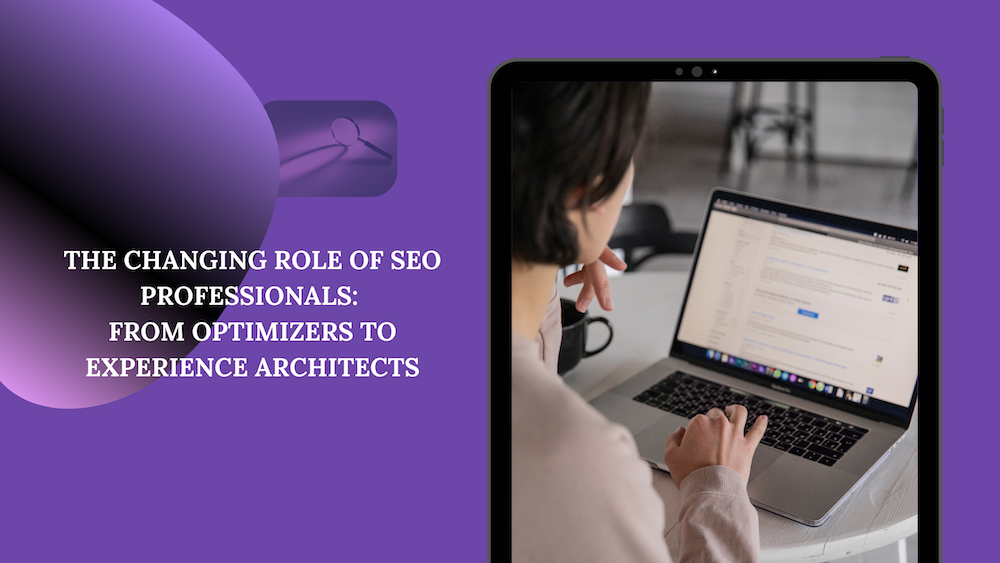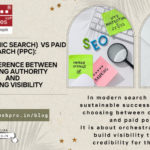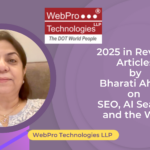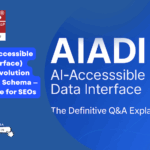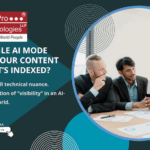In the early 2000s, an SEO professional’s job was relatively straightforward: optimize websites for search engines. This meant tweaking meta tags, stuffing keywords, building backlinks, and ensuring crawlability. Success was measured in rankings, traffic, bounce rate and CTR.
Fast forward to 2025, and the landscape has dramatically shifted. Google’s algorithms have matured beyond keyword matching to user intent understanding. AI systems like SGE (Search Generative Experience/ AI Overviews) and platforms like ChatGPT have blurred the lines between search and conversation. Today, SEO is no longer just about optimization—it's about orchestration.
SEO professionals are evolving into Experience Architects, shaping not only how content is found but how it is perceived, engaged with, and remembered.
Let’s explore this seismic shift—and what it means for the future of SEO.
- From Technical Tweaks to Strategic Storytelling
In the early days, SEO was heavily technical. Canonical tags, 301 redirects, robot.txt files—these elements still matter, but they’re no longer enough.
Today’s SEO must craft strategic, compelling narratives that align with a user's journey:
- Mapping intent across all stages of the funnel (awareness, consideration, decision).
- Creating holistic content ecosystems rather than isolated blog posts.
- Designing experiences that meet emotional and informational needs.
Example:
A B2B cybersecurity firm isn’t just optimizing landing pages anymore. They’re architecting a journey that starts with educational blog content ("What is zero-trust security?"), moves into comparison tools ("Zero-trust vs perimeter security"), and culminates in interactive demos and personalized assessments.
In this world, content architecture = search experience.
- The Rise of Search Experience Optimization (SXO)
SXO (Search Experience Optimization) is quickly becoming the new SEO.
It’s about merging:
- SEO principles (visibility, rankings),
- UX design (usability, accessibility),
- Content psychology (trust-building, narrative flow).
In short, SEO professionals are responsible for delivering satisfying experiences, not just traffic.
Key SXO Focus Areas:
- Page Load Speeds: Beyond Core Web Vitals compliance, how emotionally fast does the experience feel?
- Navigation Intuitiveness: Is the journey smooth, or does it cause friction?
- Micro-conversions: Are users encouraged subtly to engage without feeling manipulated?
Google’s Helpful Content Update (HCU) was a loud signal: experience matters more than keyword density or superficial optimization.
- Embracing Multimodal Search
Voice. Visual. Video. Text.
The modern search journey is multimodal. Users might discover a brand through a YouTube explainer, confirm credibility through a blog, and convert via a chatbot recommendation—all without ever typing a search query.
SEO professionals today must optimize across formats, not just pages:
- YouTube SEO: Titles, thumbnails, descriptions.
- Podcast SEO: Audio transcription, keyword-aligned summaries.
- Visual Search: Image alt texts, schema markup for product images.
- Conversational AI: Structuring content so that it feeds into AI models and voice assistants.
Being a true experience architect means ensuring that, no matter the mode of search, your brand's story is consistent and accessible.
- Data: From Vanity Metrics to Behavioral Insights
There was a time when pageviews and rankings were king.
But in 2025, SEO success is measured in deeper behavioral metrics:
- Dwell Time
- Engagement Rate
- Scroll Depth
- Session Intent Fulfillment (Did the session end because the user was satisfied?)
Behavioral SEO is the new normal. It’s no longer about just appearing first—it’s about satisfying the searcher’s goal so fully that the search ends.
SEO professionals now need to:
- Analyze behavioral data to map experience gaps.
- Create hypotheses and run A/B tests on content and UX.
- Collaborate with CRO (conversion rate optimization) and UX teams regularly.
- Collaboration: SEO is Now a Team Sport
SEO used to be siloed—an arcane practice handled by a few specialists.
Today, it's woven into marketing, development, UX, sales, and even customer support.
Modern SEO Professionals Work Closely With:
- Content Strategists: To ensure narrative and SEO work together.
- Web Developers: To implement SEO-friendly architecture.
- Product Teams: To align SEO with the actual user experience of the service or product.
- Brand Teams: To ensure that search visibility strengthens brand storytelling.
SEO is no longer just a tactic; it's a strategy that requires cross-functional orchestration.
- AI: A Partner, not a Threat
With the rise of AI content tools like ChatGPT, Jasper, and Claude, some feared that SEO professionals would become obsolete.
Instead, AI is a powerful tool in the SEO architect’s toolkit.
How SEO Pros Use AI Today:
- Content Ideation: Uncover content gaps and new topic clusters.
- Predictive Analysis: Forecast keyword opportunities based on emerging trends.
- Personalization Engines: Use AI to dynamically serve content tailored to user personas.
- SERP Simulation: Model how changes might affect rankings in a dynamic SERP.
But remember while AI can scale production, humans architect experience. Emotion, nuance, cultural sensitivity—these can’t be fully automated.
Human-centered SEO is the differentiator. https://searchengineland.com/the-art-of-ai-enhanced-content-8-ways-to-keep-human-creativity-front-and-center-447314
- E-E-A-T: The New Core of SEO Architecture
Google’s concept of E-E-A-T (Experience, Expertise, Authoritativeness, Trustworthiness) has been emphasized more than ever.
Being an Experience Architect means optimizing not only for what you say but who says it and how they say it.
Key Actions:
- Showcase real-world experience (case studies, testimonials, original research).
- Build author profiles that reflect genuine expertise.
- Cultivate brand authority through collaborations, PR, and third-party mentions.
- Design trust signals into the UX (certifications, privacy assurances, transparent policies).
In short:
SEO is about building digital trust ecosystems, not just page titles.
- SEO = Reputation Management
Increasingly, your SEO presence is your brand reputation.
Search results are dynamic. Knowledge panels, featured snippets, review aggregators, Reddit discussions, YouTube, TikTok and Instagram videos—all contribute to a user’s perception of your brand before they even reach your website.
As experience architects, SEO professionals must:
- Monitor brand mentions across search surfaces.
- Optimize positive user-generated content.
- Preemptively address potential negative narratives.
Proactive reputation SEO is becoming a non-negotiable part of digital strategy.
- Training the Next Generation: Beyond SEO 101
Today's SEO training cannot be limited to:
- "This is a title tag."
- "This is a backlink."
The next generation needs to understand:
- Behavioral psychology of searchers
- Story-driven content frameworks
- Data interpretation and storytelling
- Ethical AI usage
- Holistic digital strategy thinking
SEO is no longer an entry-level skill. It is an executive-level strategic discipline.
Universities, training institutes, and in-house onboarding programs must update their curricula accordingly.
The Future Belongs to the Architects
As we stand in 2025 and look ahead, it’s clear:
SEO professionals are not just digital tacticians anymore. They are the architects of search experiences.
They:
- Understand and map human intent.
- Shape narratives across multimodal platforms.
- Optimize not just for visibility but for emotional resonance.
- Build trust ecosystems at scale.
- Collaborate cross-functionally to elevate the entire brand experience.
The future of SEO isn’t just about playing the search engine’s game.It’s about understanding the human behind the search query—and architecting a journey so good they choose to stay. The focus is to optimize whatever the platform. Our search campaigns should focus on overall visibility on the web rather than only giving importance to traditional search engine results.
April 29, 2025
